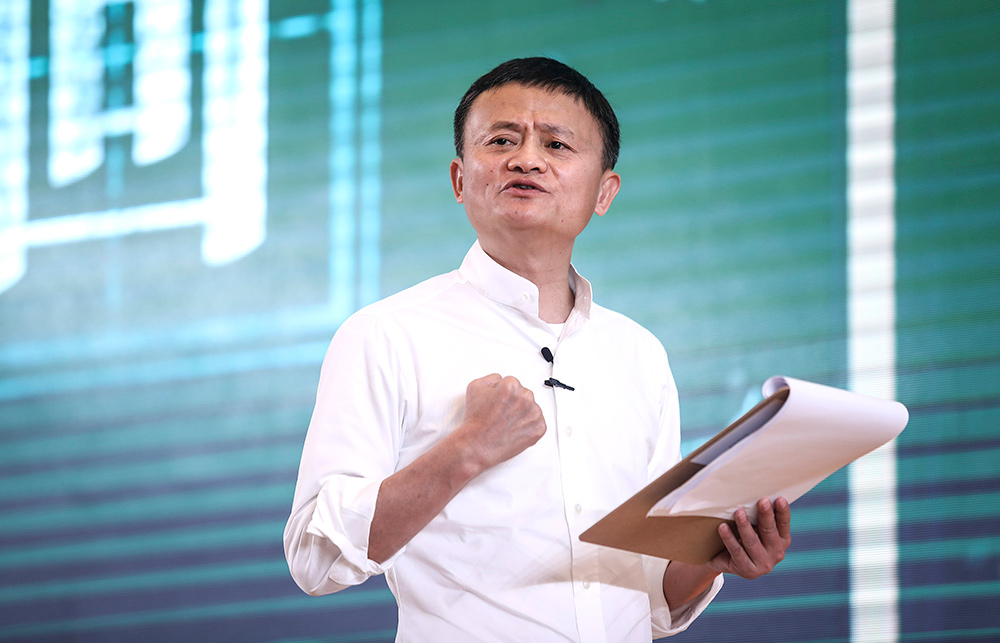
在办公空间供应商WeWork崩溃与新冠疫情爆发之前,软银创始人孙正义曾表示,在最初募集1000亿美元愿景基金后,他希望每两到三年再募集一只新的基金。然而,现在看来,第一只愿景基金可能是最后一只。
软银集团于周一表示,愿景基金在最近一个财年亏损177亿美元,是该公司39年历史上最严重的一次亏损。受到投资失误和新冠疫情的影响,软银不得不减记WeWork和Uber等公司的估值。目前该基金的回报率为-6%,而一年前为62%。
孙正义承认,他不太可能再做另一只愿景基金了。在软银退出电信业务时,他曾宣称愿景基金是软银的未来。这家总部位于东京的公司将继续用自己的资金进行投资。孙正义还表示,在愿景基金投资的公司中,约有15家公司可能破产,另有15家公司可能会获得巨大成功。
孙正义在东京举办的记者招待会上称,愿景基金的业绩并不值得骄傲。“如果投资回报不好,就无法从投资者那里募集资金。如今情况不太乐观,所以我们用自己的钱进行投资。”
孙正义还表示,阿里巴巴集团的创始人马云将辞去董事职务,并且公司可能不会派息以便保存现金。截至目前,马云已在软银董事会任职13年。
引发大萧条
此外,孙正义在周一还承认,此前没有预料到新冠疫情将如何影响全球经济。他说:“当时很多人都没有想到新冠疫情会持续如此之久。”在他的演讲中,重点突出了当下情形与大萧条时期的比较。软银再次将WeWork的估值下调至29亿美元,与巅峰时期的估值相去甚远。
软银集团也在周一宣布,计划出售至多价值4.5万亿日元的资产,用来增强其资产负债表和提振股价。
该公司出售持有的阿里巴巴股票,以筹集115亿美元资金,同时也正考虑出售日本国内电信子公司SoftBank Corp. 和 T-Mobile US Inc.的股权,筹集剩余所需资金。
该公司在周一还表示,计划在现有同等规模的回购计划基础上,在明年3月之前花5000亿日元回购其股票。这将帮助软银股价企稳,较3月低点上涨逾70%。
自1994年上市以来,软银首次撤回了股息预测,今年可能不会支付股息。“以防我们需要更多的资金。”孙正义说。
软银表示,阿里巴巴联合创始人马云将辞去董事会职务。另外,三名新董事会成员已获提名。集团首席财务官后藤芳光、芯片设计软件公司Cadence design Systems首席执行官陈立武以及早稻田大学商学院教授川本裕子将加入董事会。
“不清楚谁会追究孙正义的责任”
过去几年里,孙正义押注的风险越来越大,一些软银董事会的成员也纷纷离职。汽车制造商Nidec Corp.的创始人永守重信于2017年离职,而迅销公司的首席执行官柳井正则于去年12月离职。
东海东京研究中心(Tokai Tokyo Research Center)分析师石野雅彦表示,“由于软银董事会中没有著名的外部董事,所以现在还不清楚谁会追究孙正义的责任。”
孙正义并没有放弃,未来仍会用自己的钱进行投资。他相信,新冠疫情对经济的冲击最终可能会帮助科技公司的发展。
他说:“我相信这种冲击只会加速范式转变。”
对于孙正义来说,他不是没有见过更坏的情况。在互联网泡沫破灭时期,他损失了约700亿美元,回顾当时的经历,孙正义认为自己像是只有两根手指扒在悬崖边上。
“和过去危机相比,我现在像从上面向山谷底部望去。”孙正义表示。
东京早稻田大学商学院教授池上重辅说:“即使在最坏的情况下,孙正义所承担的风险也不会让他的公司破产。”
孙正义没有承认愿景基金已经破产。他表示,对于愿景基金承诺资本中含有的约400亿美元优先股,软银将支付7%的利息。
在被问及对未来的看法时,他认为未来仍然可以得到20%的内部回报率。现在也许是最糟糕的时候,但五年或十年后,情况可能会有所改善。
“情况非常困难,”孙正义说。“我们的独角兽掉入了这个突如其来的疫情峡谷。但其中的一些会因为这场危机而长出翅膀。”(财富中文网)
编译:于佳鑫
在办公空间供应商WeWork崩溃与新冠疫情爆发之前,软银创始人孙正义曾表示,在最初募集1000亿美元愿景基金后,他希望每两到三年再募集一只新的基金。然而,现在看来,第一只愿景基金可能是最后一只。
软银集团于周一表示,愿景基金在最近一个财年亏损177亿美元,是该公司39年历史上最严重的一次亏损。受到投资失误和新冠疫情的影响,软银不得不减记WeWork和Uber等公司的估值。目前该基金的回报率为-6%,而一年前为62%。
孙正义承认,他不太可能再做另一只愿景基金了。在软银退出电信业务时,他曾宣称愿景基金是软银的未来。这家总部位于东京的公司将继续用自己的资金进行投资。孙正义还表示,在愿景基金投资的公司中,约有15家公司可能破产,另有15家公司可能会获得巨大成功。
孙正义在东京举办的记者招待会上称,愿景基金的业绩并不值得骄傲。“如果投资回报不好,就无法从投资者那里募集资金。如今情况不太乐观,所以我们用自己的钱进行投资。”
孙正义还表示,阿里巴巴集团的创始人马云将辞去董事职务,并且公司可能不会派息以便保存现金。截至目前,马云已在软银董事会任职13年。
引发大萧条
此外,孙正义在周一还承认,此前没有预料到新冠疫情将如何影响全球经济。他说:“当时很多人都没有想到新冠疫情会持续如此之久。”在他的演讲中,重点突出了当下情形与大萧条时期的比较。软银再次将WeWork的估值下调至29亿美元,与巅峰时期的估值相去甚远。
软银集团也在周一宣布,计划出售至多价值4.5万亿日元的资产,用来增强其资产负债表和提振股价。
该公司出售持有的阿里巴巴股票,以筹集115亿美元资金,同时也正考虑出售日本国内电信子公司SoftBank Corp. 和 T-Mobile US Inc.的股权,筹集剩余所需资金。
该公司在周一还表示,计划在现有同等规模的回购计划基础上,在明年3月之前花5000亿日元回购其股票。这将帮助软银股价企稳,较3月低点上涨逾70%。
自1994年上市以来,软银首次撤回了股息预测,今年可能不会支付股息。“以防我们需要更多的资金。”孙正义说。
软银表示,阿里巴巴联合创始人马云将辞去董事会职务。另外,三名新董事会成员已获提名。集团首席财务官后藤芳光、芯片设计软件公司Cadence design Systems首席执行官陈立武以及早稻田大学商学院教授川本裕子将加入董事会。
“不清楚谁会追究孙正义的责任”
过去几年里,孙正义押注的风险越来越大,一些软银董事会的成员也纷纷离职。汽车制造商Nidec Corp.的创始人永守重信于2017年离职,而迅销公司的首席执行官柳井正则于去年12月离职。
东海东京研究中心(Tokai Tokyo Research Center)分析师石野雅彦表示,“由于软银董事会中没有著名的外部董事,所以现在还不清楚谁会追究孙正义的责任。”
孙正义并没有放弃,未来仍会用自己的钱进行投资。他相信,新冠疫情对经济的冲击最终可能会帮助科技公司的发展。
他说:“我相信这种冲击只会加速范式转变。”
对于孙正义来说,他不是没有见过更坏的情况。在互联网泡沫破灭时期,他损失了约700亿美元,回顾当时的经历,孙正义认为自己像是只有两根手指扒在悬崖边上。
“和过去危机相比,我现在像从上面向山谷底部望去。”孙正义表示。
东京早稻田大学商学院教授池上重辅说:“即使在最坏的情况下,孙正义所承担的风险也不会让他的公司破产。”
孙正义没有承认愿景基金已经破产。他表示,对于愿景基金承诺资本中含有的约400亿美元优先股,软银将支付7%的利息。
在被问及对未来的看法时,他认为未来仍然可以得到20%的内部回报率。现在也许是最糟糕的时候,但五年或十年后,情况可能会有所改善。
“情况非常困难,”孙正义说。“我们的独角兽掉入了这个突如其来的疫情峡谷。但其中的一些会因为这场危机而长出翅膀。”(财富中文网)
编译:于佳鑫
Before the meltdown at WeWork and the outbreak of the coronavirus pandemic, Masayoshi Son said he would like to raise a new Vision Fund every two to three years after his initial $100 billion fund. Now the first Vision Fund looks like it could be the last.
SoftBank Group Corp. said Monday the Vision Fund lost $17.7 billion in the most recent fiscal year, triggering the worst loss ever in the Japanese company’s 39-year history. SoftBank had to write down the valuations of companies like WeWork and Uber Technologies Inc. because of business missteps and the coronavirus fallout. Its return on the fund is negative 6%, compared with 62% just a year ago, he said.
Son conceded he is unlikely to be able to draw outside investors for another Vision Fund, an initiative that he once proclaimed the future of SoftBank as it moved away from the telecom business. The Tokyo-based company will keep making startup investments with its own money, albeit more cautiously than in the past. About 15 of the fund’s startups will likely go bankrupt, he said, while another 15 are likely to thrive.
“Vision Fund’s results are not something to be proud of,” Son said at an unusual press conference in Tokyo, with reporters and analysts calling in remotely because of the pandemic. “If the results are bad, you can’t raise money from investors. Things aren’t good, that’s why we are investing with our own money.”
Son also announced Jack Ma, co-founder of Alibaba Group Holding Ltd., will leave the SoftBank board after 13 years and that his company may not pay a dividend this year to preserve cash.
Evoking the Great Depression
On Monday, Son conceded he had not anticipated how the global economy would be affected by the fallout from Covid-19.
“At that time many people could not see that the coronavirus pandemic would spread that far,” he said. His presentation was full of dark slides that highlighted comparisons between now and the Great Depression, when it took years for economic activity to recover. SoftBank wrote WeWork’s valuation down again, this time to $2.9 billion or more than 90% less than its peak.
Son is racing to put his house in order to withstand the challenges. On Monday, SoftBank also detailed plans to shore up its balance sheet and its stock price, part of a plan to sell 4.5 trillion yen in assets.
The company raised $11.5 billion from contracts to sell shares in Alibaba, its most valuable holding. SoftBank is likely to sell stock in its Japanese telecom unit SoftBank Corp. and T-Mobile US Inc.
The company also said on Monday it plans to spend up to 500 billion yen to buy back shares through next March, on top of an existing repurchase plan of the same size. That has helped SoftBank shares stabilize, rising more than 70% from their low in March.
SoftBank did not give a dividend forecast for the first in its history, saying it may not pay one this year. “Just in case we need more financing,” Son says.
Separately, SoftBank said Ma will step down as a director as part of several planned board changes. Three new directors have been nominated, including SoftBank Chief Financial Officer Yoshimitsu Goto. Lip-Bu Tan and Yuko Kawamoto will join, bringing the total of external board members to four. Kawamoto will be the first female director.
"Not clear who is going to hold Son responsible"
Son’s increasingly risky bets over the past few years coincided with departures from SoftBank’s board of some of it smost outspoken members. Shigenobu Nagamori, the founder of motor maker Nidec Corp., stepped down in 2017, while Fast Retailing Co. Chief Executive Officer Tadashi Yanai left last December.
“With no famous outside directors left on SoftBank’s board, it’s not clear who is going to hold Son responsible anymore,” said Masahiko Ishino, an analyst at Tokai Tokyo Research Center.
Son did not back away from continuing to make startup investments, although it will be with his own money for the foreseeable future. He said he believes that the economic shock of the coronavirus could end up helping technology companies in fields from ride-hailing to artificial intelligence.
“I believe this shock will only accelerate the paradigm shift,” he said.
Son famously lost about $70 billion during the dot-com bust, as startups cratered and his stock price crashed. He said the current downturn is nothing compared to that, when he was holding on by two fingers. Now, he has a more stable balance sheet and billions in assets he could sell if need be.
“Compared to the past crisis, this time I am just looking down on the bottom of the valley from above,” he said.
“Even in the worst case scenario, the risks Son has taken will not sink his company,” said Jusuke Ikegami, a professor at Waseda Business School in Tokyo.
Still, Son didn’t concede that the Vision Fund is a bust. He said SoftBank anticipates it will be able to pay a 7% return to limited partners who hold about $40 billion in preferred stock.
Pressed for some view of the future, Son said that he still thinks he could see a 20% internal rate of return on Vision Fund investments. Now is the worst possible time but in five or ten years, things may look different. He could even approach outside investors about future funds.
“The situation is exceedingly difficult,” Son said. “Our unicorns have fallen into this sudden coronavirus ravine. But some of them will use this crisis to grow wings.”






